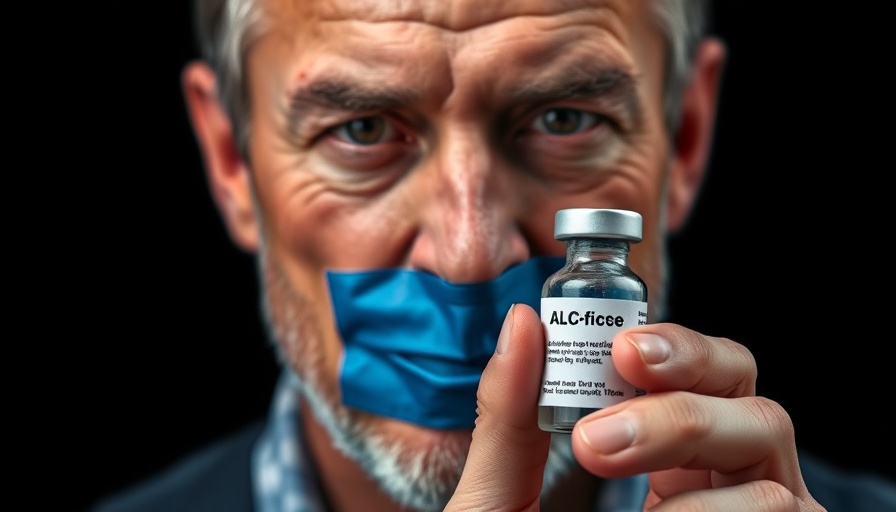
Understanding Vaccine Safety: The Need for Transparent Testing
In the quest for public health, vaccines play a critical role in preventing disease. However, doubts about their safety and efficacy have become a prevalent concern among many citizens. The video titled The Shocking Truth About Vaccines expresses deep skepticism about vaccine testing methodologies and the motivations of large pharmaceutical companies. It highlights a crucial point: if our trust in science wavers, we must explore why.
In The Shocking Truth About Vaccines, the discussion dives into the critical concerns regarding vaccine safety and efficacy, exploring key insights that sparked deeper analysis on our end.
Examining the Framework: Trust in Authority vs. Independent Scrutiny
The crux of the skepticism surrounding vaccines often stems from the perceived authority of organizations like the World Health Organization (WHO) and the Centers for Disease Control and Prevention (CDC). While these institutions aim to disseminate the best available health information, the discussion raises an important question: who funds these authorities? When financial interests from pharmaceutical companies influence health guidelines, it raises eyebrows. Much like any industry, healthcare is not insulated from profit motives. Transparency in funding sources and decision-making processes is essential to rebuilding public trust in vaccination programs.
The Case for Informed Consent: Understanding Testing Mechanisms
It’s critical to discuss how vaccines are tested for safety. Unlike typical drug testing, where a placebo may be an inert substance, children's vaccines are often tested against other active vaccines. This method can skew perceptions of safety—much like comparing whiskey with bourbon rather than water. The comparison begs the question: can we genuinely assess safety if we are not measuring against a completely neutral baseline? Advocates for more robust testing protocols argue that without true placebo groups, how effective can our claims be? This call for rigorous testing standards and comprehensive reporting is not about shunning vaccines but rather ensuring that they are as safe as possible.
Historical Insights: Learning From Past Medical Missteps
It's worth pondering historical precedents where treatments labeled as safe later proved otherwise. Medications such as Vioxx and Paxil experienced severe health repercussions long after their initial approval. These historical instances reveal glaring ethical concerns regarding public safety and corporate accountability. When a vastly influential body like the CDC holds patents on vaccines, it intensifies conversations about whether the best interests of the public are genuinely being prioritized.
What About Data Accessibility? The Need for Radical Transparency
How can we trust the conclusions drawn from health studies when so much of the data remains unpublished? Statistics show that an overwhelming 87% of pharmaceutical studies funded by industry sponsors go unpublished—often the less favorable findings, conveniently obscuring the potential risks. What kind of informed choices can we make without comprehensive access to the full spectrum of research findings? Advocating for open access to all data is crucial in fostering a more informed public. Finding a balance between proprietary interests and public health is a necessary dialogue in today’s vaccine climate.
The Role of Social Media and Public Perception
Social media plays a dual role in shaping public opinion on vaccination. On one hand, misinformation proliferates rapidly; on the other, it provides a platform for dissenting voices that question established norms. Many individuals, including prominent figures, argue against mainstream medical consensus and encourage conversations that question the status quo of scientific authority. This needs to be met with responsible engagement—encouraging dialogue rather than dismissal unnecessary to bridge gaps and share insights, rather than dismissing concerns outright.
Finding a Middle Ground: Ethics of Vaccine Development
Ultimately, the video contends that the challenge isn't centered solely around scientific findings but ethics intertwined within vaccine development and distribution. If public trust is to be regained, a culture of radical transparency must be enacted that includes an ethical evaluation of the influences behind scientific endorsements. Exploring these dynamics is vital—not just for the current generation but for future ones who will rely on vaccines as a foundational aspect of public health.
As consumers of healthcare, understanding these complex debates around vaccine safety and efficacy becomes crucial. By prioritizing informed discussions and demanding clearer insights from health authorities, we can ensure a more accountable and safety-oriented approach to public health policies.
Join the conversation about vaccine safety and transparency. Share your thoughts and experiences below, and let's advocate for informed health choices together!
 Add Element
Add Element  Add Row
Add Row 



Write A Comment